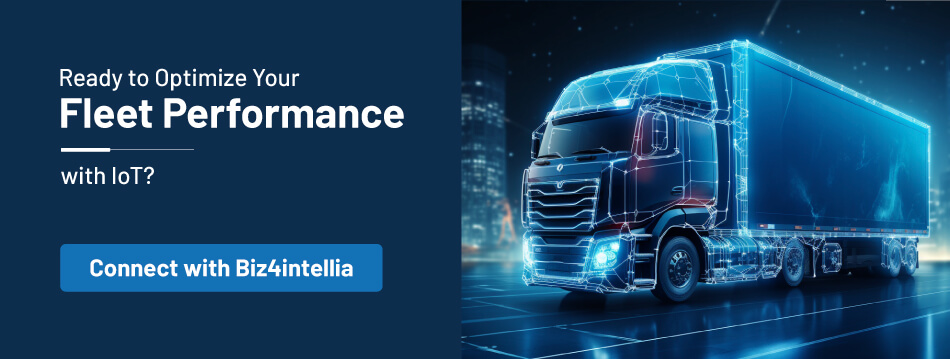Fleet plays an important role across industries. They are responsible for distributing manufactured goods and ensuring the movement of products in the supply chain.
In today’s world, where technology is evolving daily, the fleet industry is transforming rapidly. The fleet operators use real-time fleet tracking and monitoring systems in their vehicles and accept the technology to simplify complex operations.
Fleet management relies on IoT technologies for real-time monitoring and control. IoT enables the collection of data from vehicles, allowing efficient tracking, route optimization, and preventive maintenance.
It enhances safety, reduces costs, and increases productivity by providing valuable insights and automation, optimizing overall fleet performance.
Many IoT fleet management trends are transforming the fleet industry with their smart capabilities. These involve better vehicle management, improved fuel consumption activities, and data-driven insights.
A report has suggested that the IoT fleet management market will reach $15,500 million by the end of the year 2024. It reflects a tremendous rise between 2017 and 2024. This rapid growth is driven by the increasing adoption of IoT technologies in the transportation industry.
The integration of IoT sensors, GPS tracking, and data analytics enhances fleet efficiency, reduces fuel consumption, improves driver safety, and enables better decision-making. As businesses recognize the significant benefits of IoT fleet management solutions, the market is expected to continue expanding in the coming years.
Here are 8 IoT fleet management trends that will fuel this growth.
8 Trends Transforming The Fleet Industry

Let’s stay ahead of the curve and discover how these transformative fleet management trends are shaping the future of fleet management.
1. Predictive Maintenance: Vehicle Management
Sensor technology offers new and better insights to maintain your vehicles, keeping the vehicles up-to-date. Predictive maintenance uses advanced analytics to detect vehicle issues very early.
It helps fleet operators identify vehicle failures and allows them to address or make decisions before the breakdown.
Due to this, it is a more reliable source for the fleet industry that enhances the performance of the fleets and adds value to the business.
2. Data Transparency
Nothing degrades the efficiency in an industry more than miscommunication gaps among the workers.
Complete operational visibility greatly reduces the downtime of broadcasting information around the industry premises. Installing an IoT logistics solution for your fleet business offers real-time alerts on all interconnected devices.
It allows the team members involved in the transportation process to receive the same information on time and stay updated.
Also, it enables quick decision-making, which benefits the entire fleet operation and increases overall productivity.
3. Cost Management
With the acceptance of sensor devices, the fleet sector is experiencing effective cost reduction.
Earlier, it has been a challenge for the operators to bear the expenses of vehicle damage, fuel wastage, or other flaws during an operation. The use of IoT fleet management solution improves the ways your fleet work.
Installation of GPS devices, sensors, and an interconnected network of assets works collaboratively to provide you with fine results. GPS fleet tracking system reduces the cost of maintaining every domain separately.
Moreover, this smart fleet management trend enables road safety by alerting drivers about situations like traffic, long routes, etc., thereby reducing the cost of road and vehicle maintenance costs.
4. Fuel Consumption
It is fascinating that you drive smart vehicles, which indicate fuel requirements and send you alerts regarding fuel levels on your connected smartphone. Well, fuel is one of the prime needs of a vehicle.
The fluctuating fuel costs affect the fleet industry's performance and fuel consumption practices. Hence, a smart solution is a must-have that lets you know about fuel utilization at every mile.
Moreover, IoT solutions help reduce fuel consumption by optimizing the routes.
5. Advanced Telematics
In the fleet industry, telematics is one of the focal points that work to analyze the driver's behavior and provide odometer readings.
It is essential to schedule vehicle maintenance and manage spare part inventories before the requirements.
Additionally, advanced telematics in a fleet management system records the vehicle's location and provides real-time alerts. It makes IoT technology more accountable and easier to share live information at every step.
Moreover, the fleet operators can also determine the exact and current location of the driver, enabling them to coordinate in real-time and reduce delivery delays along with quicker re-scheduling, if required.
6. Cybersecurity
Cybersecurity in fleet management is crucial for ensuring vehicle, driver, and data safety, efficiency, and integrity.
Compliance with cybersecurity standards is essential to protect fleets from cyber threats and meet regulatory requirements. Proactive measures such as encryption, authentication, firewalls, and antivirus software prevent unauthorized access, data breaches, and cyberattacks.
Collaboration and information sharing among fleet operators, manufacturers, service providers, and regulators enhance cyber resilience. In the digital age, startups, and scale-ups are developing cloud-based platforms, blockchain, and biometrics solutions to bolster the security and performance of fleets.
By prioritizing cybersecurity, fleet managers can safeguard their operations and data, and this fleet management trend will mitigate risks and ensure smooth and secure fleet management.
7. 5G Technology
In recent years, the deployment of 5G technology has gradually expanded in metropolitan areas worldwide, offering fleets faster data transfer speeds and improved connectivity.
As we enter 2023, the trend of 5G accessibility continues to rise, paving the way for wider adoption of 5G-compatible hardware and enhanced fleet management capabilities.
With the integration of 5G, the future of fleet management promises to be faster and more streamlined than ever. Fleet managers are already experiencing increased reliability in driver communication compared to previous years.
The advanced capabilities of 5G enable managers to receive more precise and real-time telematic data, irrespective of weather conditions or other factors that could impact data quality. This fleet management trend ensures better decision-making, enhanced operational efficiency, and improved overall performance.
As 5G becomes more accessible, an increasing number of fleets are expected to embrace this technology in 2023.
This widespread adoption will have far-reaching positive impacts across various industries. From transportation and logistics to delivery services and beyond, fleets equipped with 5G-enabled hardware will experience improved connectivity, faster data processing, and greater operational agility.
Ultimately, integrating 5G in fleet management will contribute to increased productivity, cost savings, and a more sustainable and efficient future for the industry.
8. 3D Printing for Replacement Parts
Innovative technological advancements, including IoT for fleet management, are transforming how fleet managers approach vehicle maintenance and repair. One such breakthrough is the adoption of 3D printing to produce replacement parts.
Fleet managers increasingly recognize the potential of 3D printing technology and IoT capabilities to mitigate downtime and reduce costs associated with traditional replacement part sourcing.
By leveraging 3D printing and IoT, fleet managers can produce required replacement parts on-site, eliminating the need for lengthy procurement processes and shipping delays.
Moreover, combining 3D printing and IoT offers the flexibility to create custom parts tailored to specific fleet requirements, ensuring an optimal fit and performance.
Using 3D printing and IoT in replacement part production also presents cost-saving opportunities for fleet managers.
With the ability to produce parts on demand, fleet managers can bypass expenses associated with inventory management and reduce overall procurement expenses.
Integrating 3D printing and IoT technology in fleet management represents a paradigm shift in how replacement parts are sourced and utilized.
By embracing this innovative approach, fleet managers can enhance operational efficiency, reduce costs, and improve overall fleet availability.
As the technology continues to evolve, 3D printing, along with IoT, holds great promise for revolutionizing the maintenance and repair processes within the fleet industry.
Wrapping Up!
IoT is taking the fleet industry to a whole new level. With innovative and brilliant concepts, the Internet of Things brings a 360° transformation into the fleet industry.
Also, there's no denying that the fleet industry will grow yearly along with a brand-new IoT concept. It will surely increase the competition, but you need the best industrial IoT solution that renders end-to-end services to your fleet business to stay ahead of the trend.
Hence, a smart fleet monitoring system is the key IoT use case that brings out the true potential of the fleet industry.














